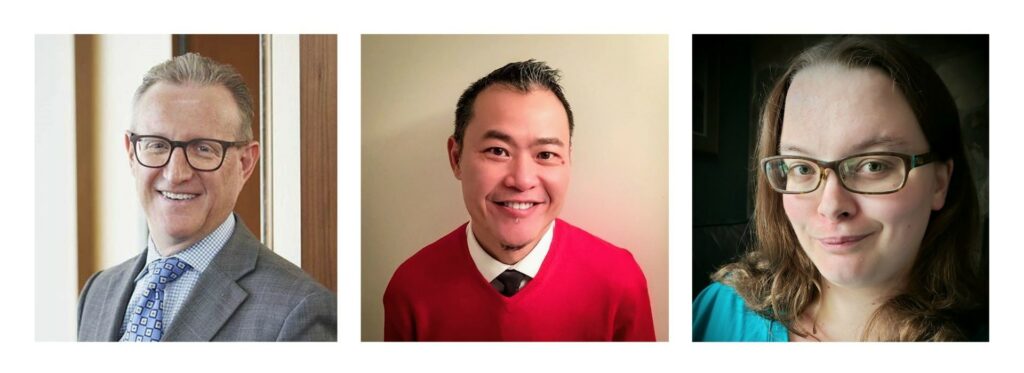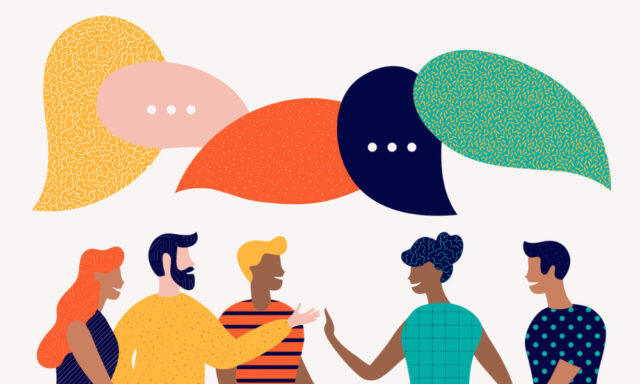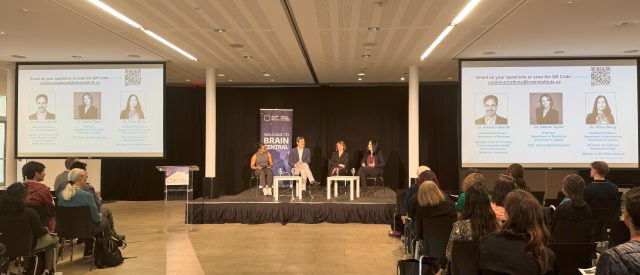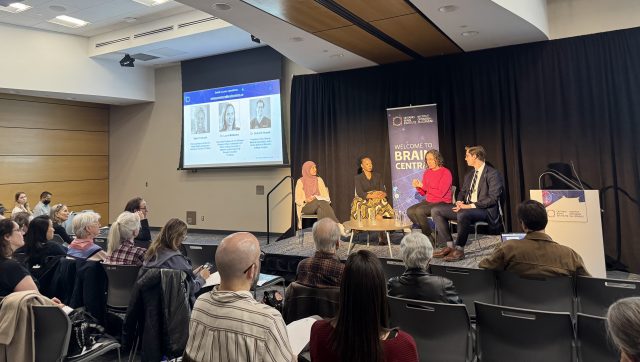Did you know that 1 in 3 Canadians will be impacted by a brain disorder at some point in their lives? Considering this statistic, it is important that we understand brain disorders and how they affect the ways in which we live our lives. One of the best ways in which to learn about these disorders is from the people directly living with them and hearing how their individual experiences have shaped their paths in life.
In February 2022, the Ontario Brain Institute (OBI) hosted our “Three Lives, Many Stories” Public Talk as part of the Wellness Series. At the event, three panelists shared their individual journeys with brain disorders and how they engage with the world around them, as well as the hurdles they have overcome. Amanda St. Dennis, Larry Linton, and Andrew Kcomt came together to provide an in-depth overview of their own experiences with specific brain disorders, but also drew parallels to similar successes and struggles throughout their journeys. Moderated by Amanda Leduc, the acclaimed author of Disfigured: On Fairy Tales, Disability, and Making Space, this informative panel is a valuable resource for those wanting to learn more about life with a brain disorder.
Panelist Profiles
Larry Linton is an experienced lawyer, skilled musician, and passionate advocate. Larry was also diagnosed with Parkinson’s Disease in 2012. When he first got his diagnosis, Larry entered a dark chapter in his life, struggling to come to terms with what this meant for his family, his passions, and his career. After two years, Larry was no longer going to let Parkinson’s control his life; He became physically active again, and over the next three years he completed 3 half-marathons. As for advocacy, Larry works to educate employers about Parkinson’s and the invisible symptoms that exist with the disease, as well as chairs the Parkinson’s Canada’s Patient Advisory Council and is a member of the ONDRI Patient Advisory Council. Larry believes that neurodivergent individuals are not to be thought of as disabled, but as differently abled.
“Don’t wait for a diagnosis. Live your life like you’ve received a diagnosis, because that gave me focus, and gives me focus, on a day-to-day basis.”
Larry Linton
Andrew Kcomt started his career in the pharmaceutical industry, but through his experience with anxiety and depression, is now the Knowledge Translation & Research Manager at Hope and Me Mood Disorders Association of Ontario (MDAO). Before Andrew got his depression diagnosis 20 years ago, he found he was isolating himself from his loved ones while experiencing burn out, anxiety, and other symptoms. When Andrew’s doctor suggested he try out a peer support group, he was initially hesitant, but little did he know this would be his first engagement with MDAO. Andrew related to other attendees’ mental health experiences and felt validated in his own journey. Over the years, Andrew has learned that it is possible to live a fulfilling life while having different mood and brain disorders, which he states is particularly important for the public to realize. Living with mood and brain disorders and the experiences associated with them cultivate empathy and compassion for others navigating similar challenges.
“I really hope this series will help people remember that you are not your illness. Whether you live with a mood or brain disorder, there can be a lot of strength in that in many ways.”
Andrew Kcomt
Amanda St. Dennis loves horseback riding, advocacy work, and camp. She is also diagnosed with mild-to-moderate right-side hemiplegic spastic cerebral palsy, as well as ADHD, anxiety, and believes she is autistic. Amanda’s love for camp is reflected in her 10 years working at Easter Seals Camp Merrywood. One of her goals at this camp has been to help campers realize that they can do the little things – whether that be getting into a kayak for the first time by themselves or completing tasks like putting on a sock for the first time. Her advocacy work shines through her involvement with CanChild as a member of CP-NETs Stakeholder Advisory Committee and its Transition Hub. Amanda is also a co-investigator in a research study looking at barriers to research participation for youth with neurodevelopmental disabilities.
“And that, to me, is what inclusion is – it’s meeting people where they are. It’s valuing each and every one of us for what we can bring to the table, what we bring to a job.”
Amanada St. Dennis

Panelist Discussion
Within the discussion, Larry covers many topics relating to his journey with Parkinson’s disease, including the stages of grief he experienced, his acceptance of the diagnosis and living with intent, and his advocacy work. Through his personal experience, he understands that to acknowledge illness is to acknowledge community and the shared responsibility we all have towards one another, resulting in his goal to educate others on the value those with chronic illnesses bring to their workplaces. When asked what inclusion looks like in the future for him, Larry says it starts at the leadership level within workplaces to lead by example and remove stigmas.
The concept of resiliency is brought up when Andrew is discussing his diagnosis – he focuses on how resiliency doesn’t magically make your problems go away, but it allows you to reflect on your past and learn from that experience moving forward. He also discusses the shame of having mood and brain disorders and the double standard when compared to physical illnesses. On the topic of addressing structural barriers to diagnosis, treatment, and support, Andrew talked about the importance of implementing conversations and creating the necessary space to talk about mood and brain disorders openly and safely. If these spaces are created and conversations are started, it benefits everyone.
Community is a very important theme when discussing brain disorders, and one Amanda ties into accommodations seamlessly. She is quick to remind that we all have needs met and unmet, and instead of viewing accommodation as exclusive to those living with disabilities and disorders, look at it as inclusive to everyone. When asked how society could learn more about how best to support someone living with a brain disorder, Amanda offered 3 opportunities: Cerebral Palsy Ontario, the Ontario Brain Institute, and alternatively, looking for media created by those living with brain disorders. The individuals with the lived experiences understand their disorder best, after all.
It is the hope of these panelists that those who watch this discussion have an increased awareness of how unique each brain disorder can be, as well as the experiences of the individual with the disorder. Society’s attitudes surrounding brain disorders are changing and stigmas are slowly beginning to be challenged. This increases the motivation to continue to advocate for inclusion and accommodation for the 1 in 3 Ontarians impacted by brain disorders. But there is still work to be done. By continuing to have these conversations and engaging in the advocacy work that is being completed, we can all better understand how these disorders impact those around us.
“Nothing for us, without us.”
Amanda St. Dennis echoes a well-known social model of disability slogan
To enjoy the full discussion, watch the video on Youtube.
If you would like to learn more about other talks and events, please visit our YouTube channel and Events page as well as subscribe to our mailing list!



